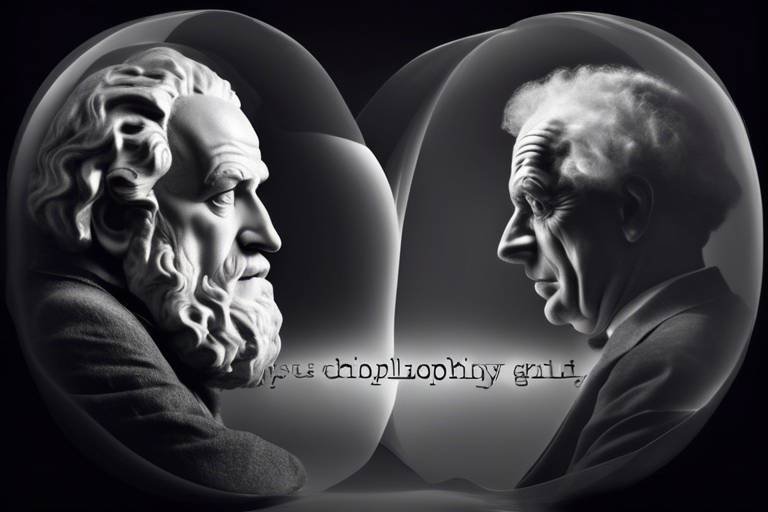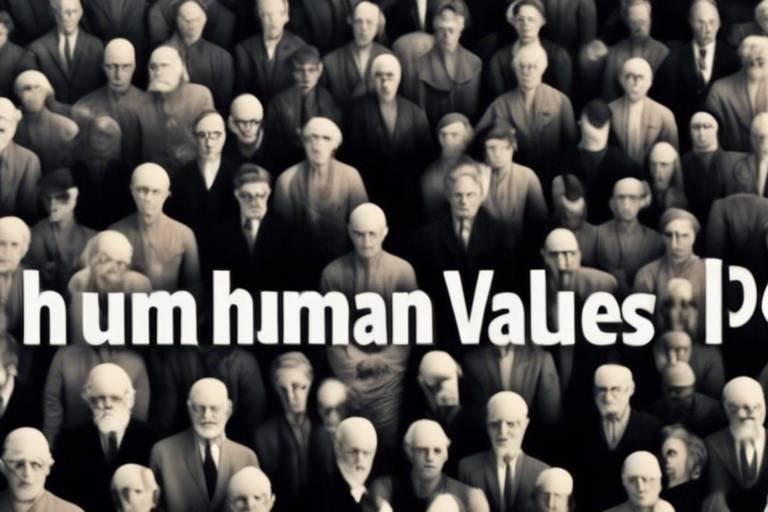The Overlap Between Philosophy and Cognitive Science
The intricate dance between philosophy and cognitive science is nothing short of fascinating. Imagine two scholars, one pondering the nature of existence while the other delves into the mechanics of thought—both are striving to understand the essence of the human experience. In a world where technology and neuroscience evolve at breakneck speed, the questions posed by philosophy remain ever-relevant. How do we know what we know? What constitutes the mind? These inquiries form the backbone of cognitive science, which seeks to unravel the complexities of the human brain and behavior.
At the heart of this overlap lies a shared curiosity about consciousness, knowledge, and the very fabric of human behavior. Cognitive science, with its roots in psychology, neuroscience, linguistics, and artificial intelligence, draws heavily from philosophical ideas. Think of it as a rich tapestry where each thread represents a different discipline, yet all contribute to a more profound understanding of the mind. Philosophers have long debated the nature of reality and perception, and these discussions have paved the way for cognitive scientists to explore how we process information, make decisions, and even experience emotions.
One cannot help but marvel at how these two fields inform each other. For instance, consider the philosophical question of free will. Cognitive science, through studies in neurobiology and psychology, provides insights into how decisions are made, often challenging our traditional notions of autonomy. This interplay prompts further philosophical inquiry: If our choices are influenced by biological processes, what does that mean for our sense of self and moral responsibility?
Moreover, the advancements in cognitive science have led to new philosophical questions. As we develop artificial intelligence that mimics human thought processes, we must ask ourselves: Can machines truly think? What does it mean to be conscious? These inquiries not only enrich our understanding of technology but also force us to revisit age-old philosophical dilemmas.
In summary, the overlap between philosophy and cognitive science is a vibrant arena of exploration. Each discipline enhances the other, creating a dialogue that pushes the boundaries of our knowledge. As we continue to explore the depths of the human mind, we find that the questions posed by philosophers are not merely academic; they are the very questions that drive scientific inquiry and innovation.
- What is cognitive science? Cognitive science is an interdisciplinary field that studies the mind and its processes, including how people think, learn, and remember.
- How does philosophy influence cognitive science? Philosophy provides foundational questions and frameworks that guide cognitive science research, particularly in areas like consciousness and knowledge.
- What are the main philosophical questions in cognitive science? Key questions include the nature of consciousness, the relationship between mind and body, and the implications of artificial intelligence.
- Can machines think like humans? This question is a significant philosophical and scientific debate, focusing on the definitions of thought and consciousness.

Philosophical Foundations of Cognitive Science
Cognitive science, an interdisciplinary field that combines elements of psychology, neuroscience, artificial intelligence, linguistics, anthropology, and philosophy, is deeply rooted in the rich soil of philosophical inquiry. At its core, cognitive science seeks to unravel the mysteries of the mind, knowledge, and consciousness. But how did philosophy shape this complex tapestry? To understand the philosophical foundations of cognitive science, we must first explore the enduring questions that have haunted philosophers for centuries: What is the nature of the mind? How do we acquire knowledge? And what does it mean to be conscious?
Historically, philosophers have laid the groundwork for cognitive science by posing questions that challenge our understanding of human thought and behavior. For instance, the ancient Greeks, such as Plato and Aristotle, pondered the essence of knowledge and the mechanisms of perception. Their inquiries set the stage for later philosophical explorations that would directly influence cognitive science. Today, cognitive scientists often find themselves revisiting these age-old questions, drawing on philosophical insights to inform their research and theories.
One of the primary philosophical foundations of cognitive science is the distinction between empiricism and rationalism. Empiricists argue that knowledge is derived from sensory experience, while rationalists contend that reason and innate ideas play a crucial role. This debate continues to resonate within cognitive science, particularly in discussions about how we learn and process information. For example, cognitive development theories often grapple with the balance between learned experiences and inherent cognitive structures.
Additionally, the concept of consciousness has been a focal point of philosophical inquiry, with thinkers like Descartes famously stating, "I think, therefore I am." This assertion not only highlights the importance of self-awareness but also raises questions about the nature of consciousness itself. Cognitive science has taken these philosophical musings and attempted to ground them in empirical research, exploring how consciousness arises from neural processes and how it influences behavior.
Philosophy also provides a framework for understanding the implications of cognitive science findings. For instance, as cognitive scientists uncover the mechanisms behind decision-making and behavior, philosophical questions about free will and determinism come to the forefront. Are our choices truly our own, or are they the result of complex biochemical processes? Such inquiries challenge us to reconsider our understanding of agency and moral responsibility.
Furthermore, the relationship between language and thought is another area where philosophy intersects with cognitive science. Philosophers like Ludwig Wittgenstein have argued that the limits of our language are the limits of our world. This idea prompts cognitive scientists to investigate how language influences our cognitive processes and shapes our understanding of reality. Are our thoughts confined to the structures of our language, or can we think beyond the words we use?
In summary, the philosophical foundations of cognitive science are not merely historical artifacts; they are alive and relevant in today's research landscape. By engaging with philosophical questions, cognitive scientists can deepen their understanding of the mind and its workings. This interplay between philosophy and cognitive science not only enriches the field but also provides a more comprehensive view of human cognition, bridging the gap between abstract thought and empirical investigation.

Key Philosophers Influencing Cognitive Science
Cognitive science, a multidisciplinary field that seeks to understand the workings of the mind, owes much of its foundation to the insights of several key philosophers. These thinkers have not only shaped the way we approach the study of cognition but have also provided frameworks that continue to influence contemporary theories. Among these influential figures, René Descartes, Immanuel Kant, and Daniel Dennett stand out for their groundbreaking ideas that bridge philosophy and cognitive science.
Descartes, often referred to as the father of modern philosophy, introduced the concept of dualism, which posits a distinct separation between the mind and body. This notion has profound implications for cognitive science, particularly in discussions surrounding consciousness and the nature of mental states. Descartes famously declared, “I think, therefore I am,” highlighting the importance of thought as the essence of existence. His ideas prompt us to ponder: if the mind and body are separate, how do they interact? This question remains central to cognitive science, driving research into the mechanisms of consciousness.
Moving on to Kant, his contributions to epistemology—the study of knowledge—provide a critical lens through which we can examine cognitive processes. Kant argued that our understanding of the world is shaped by both sensory experiences and inherent cognitive structures. This duality suggests that while we perceive the world through our senses, our minds play an active role in interpreting these sensations. Kant’s ideas challenge cognitive scientists to consider not just the raw data of perception but also the cognitive frameworks that shape our understanding. His work encourages a deeper inquiry into how knowledge is constructed, fostering an ongoing dialogue between philosophy and cognitive science.
Then we have Daniel Dennett, a contemporary philosopher who has made significant strides in integrating cognitive science with philosophical inquiry. Dennett advocates for a naturalistic view of consciousness, arguing that mental processes can be understood through the lens of evolutionary biology and cognitive neuroscience. His work emphasizes the importance of narrative in shaping human experience and consciousness. For Dennett, consciousness is not a singular entity but a collection of processes that can be studied scientifically. His ideas challenge us to rethink traditional notions of the mind and encourage cognitive scientists to explore the implications of their findings on our understanding of consciousness.
In summary, the interplay between philosophy and cognitive science is rich and complex, with philosophers like Descartes, Kant, and Dennett providing essential insights that continue to inform and challenge our understanding of the mind. Their contributions invite us to explore profound questions about the nature of thought, knowledge, and consciousness, ultimately enriching the field of cognitive science. As we delve deeper into these philosophical underpinnings, we can better appreciate the intricate tapestry of human cognition and the myriad factors that shape our understanding of ourselves and the world around us.
- What is the significance of dualism in cognitive science? Dualism, introduced by Descartes, emphasizes the distinction between mind and body, prompting exploration into how these two entities interact.
- How did Kant influence our understanding of knowledge? Kant's theories suggest that knowledge is shaped by both sensory experiences and cognitive structures, urging cognitive scientists to consider the role of interpretation in perception.
- What is Dennett’s view on consciousness? Dennett advocates for a naturalistic approach to consciousness, viewing it as a collection of processes rather than a singular phenomenon, which has implications for cognitive neuroscience.

Descartes and Dualism
René Descartes, often hailed as the father of modern philosophy, introduced the concept of dualism, which posits a fundamental distinction between the mind and the body. This idea is like a dividing line, separating our physical existence from our mental experiences. Imagine if your mind was a separate entity, floating above your body, observing and processing the world around you. This intriguing notion invites us to ponder the intricate relationship between our thoughts and our physical selves.
Descartes famously declared, "Cogito, ergo sum" or "I think, therefore I am." This statement underscores the significance he placed on consciousness as the essence of being. For Descartes, the mind is a non-material substance that cannot be reduced to physical processes. This perspective raises essential questions about how mental states can influence bodily actions and vice versa. For instance, how can a thought of fear trigger a physiological response like sweating or a racing heart? This mind-body interaction remains a hot topic in cognitive science today.
One of the key implications of Descartes' dualism is its challenge to the purely materialistic view of the universe. While many scientists advocate for a model where everything can be explained through physical laws and biological processes, Descartes invites us to consider the subjective experience of consciousness. This leads to a fascinating intersection between philosophy and cognitive science, where researchers strive to understand how mental phenomena can arise from physical substrates.
Moreover, Descartes' dualism has paved the way for various philosophical debates and theories within cognitive science. For example, consider the following aspects:
- Consciousness: How do we define consciousness in a dualistic framework? Is it merely a byproduct of brain activity, or does it exist independently?
- Free Will: If the mind is separate from the body, what implications does this have for our understanding of free will and moral responsibility?
- Artificial Intelligence: Can machines possess a mind or consciousness, or are they simply advanced tools devoid of true mental states?
In contemporary discussions, Descartes' dualism remains a vital reference point. Cognitive scientists and philosophers continue to grapple with the implications of his ideas, examining how they align or conflict with modern understandings of neuroscience and psychology. By exploring these connections, we can deepen our comprehension of the mind and its remarkable capabilities.
As we delve deeper into the realms of cognitive science, Descartes' influence serves as a reminder that the exploration of consciousness is not merely a scientific endeavor but also a profound philosophical inquiry. His legacy encourages us to keep questioning the nature of reality, the essence of our thoughts, and the intricate dance between mind and body.

Kant's Epistemology
Immanuel Kant, a towering figure in Western philosophy, reshaped our understanding of knowledge and perception through his groundbreaking epistemological theories. At the heart of Kant's philosophy is the assertion that our knowledge is not solely derived from experience but is also shaped by the innate structures of our mind. This dual approach posits that while we encounter the world through our senses, our understanding of that world is filtered through a framework of concepts and categories that our mind imposes upon it.
Kant famously introduced the idea of "transcendental idealism," which suggests that we can never access things as they are in themselves, but only as they appear to us through our perceptions. This leads to the intriguing conclusion that human cognition is inherently limited; we are bound by the ways our minds interpret sensory data. For instance, when we perceive a tree, we do not just see the tree itself; instead, we see it through the lens of our conceptual understanding of "tree," which is influenced by our past experiences and the inherent structures of our cognition.
One of the most significant implications of Kant's epistemology for cognitive science is the emphasis on the active role of the mind in shaping knowledge. This perspective aligns with contemporary cognitive theories that argue our mental processes are not passive but actively construct our understanding of reality. For example, cognitive scientists explore how memory, attention, and perception interact to create a coherent picture of the world, echoing Kant's notion that the mind plays a crucial role in organizing sensory input.
Furthermore, Kant's distinction between "a priori" knowledge (knowledge independent of experience) and "a posteriori" knowledge (knowledge dependent on experience) has profound implications for cognitive science. Understanding how these types of knowledge operate can help researchers develop models that explain how humans learn and process information. For instance, a priori knowledge could relate to innate cognitive structures that allow us to grasp complex concepts, while a posteriori knowledge pertains to the learning that occurs through interaction with our environment.
In summary, Kant's epistemology not only provides a philosophical foundation for the study of cognition but also invites cognitive scientists to explore the interplay between innate mental frameworks and experiential learning. By recognizing that our understanding of the world is a product of both sensory data and cognitive processes, we can better appreciate the complexities of human thought and perception. This interplay continues to inspire research in cognitive science, as scholars strive to unravel the mysteries of how we think, learn, and understand the world around us.
- What is Kant's main contribution to epistemology? Kant's main contribution is the idea that knowledge is shaped by both sensory experience and the mind's innate structures.
- How does Kant's philosophy relate to cognitive science? Kant's emphasis on the active role of the mind in shaping knowledge aligns with contemporary cognitive theories that explore how mental processes construct our understanding of reality.
- What are a priori and a posteriori knowledge? A priori knowledge is independent of experience, while a posteriori knowledge is derived from sensory experience.

Dennett's Philosophy of Mind
When we dive into the world of Daniel Dennett, we find a vibrant tapestry woven from philosophy, cognitive science, and a sprinkle of humor. Dennett challenges traditional views on consciousness and the mind, advocating for a naturalistic approach that aligns closely with scientific inquiry. Rather than viewing consciousness as an elusive, mystical entity, he presents it as a product of complex brain processes. This perspective invites us to reconsider how we define and understand the mind itself.
One of Dennett's most compelling contributions is his concept of the “intentional stance.” He suggests that to make sense of complex systems, especially those involving minds—human or artificial—we should treat them as if they have beliefs and desires. This doesn't mean we assume they are conscious in a traditional sense; rather, it’s a practical approach to understanding behavior. For instance, when we observe a dog, we might say it wants to fetch a ball. This interpretation allows us to predict its actions without needing to delve into its subjective experience. It’s a bit like reading a book: we can appreciate the story without knowing the author’s every thought.
In his book, “Consciousness Explained,” Dennett argues against the notion of a central "theater" in the mind where consciousness plays out. Instead, he proposes that consciousness is more like a multi-threaded narrative created by various brain processes working in tandem. This analogy can be likened to a bustling city where countless events occur simultaneously, and it’s only when we zoom out that we see the overall picture. By embracing this view, we can better understand the intricate workings of cognition and the nature of our conscious experiences.
Furthermore, Dennett's work raises essential questions about the implications of cognitive science on our understanding of free will. If our thoughts and decisions are the result of complex, deterministic processes, what does that mean for our sense of agency? Dennett argues that acknowledging the mechanistic nature of our minds doesn’t strip us of free will; rather, it enriches our understanding of it. He suggests that free will can be viewed as a product of our cognitive architecture, allowing us to navigate choices within a framework shaped by our biology and experiences.
In summary, Dennett's philosophy of mind serves as a bridge between philosophy and cognitive science, fostering a dialogue that challenges us to think critically about our understanding of consciousness. His ideas encourage us to embrace a more scientific approach to the mind while also recognizing the richness of human experience. As we continue to explore these intersections, we may find ourselves not only questioning what it means to think and feel but also celebrating the complexity of our cognitive lives.
- What is Dennett's view on consciousness?
Dennett believes consciousness is not a singular entity but a collection of processes that create a narrative experience. - How does Dennett's philosophy relate to free will?
He argues that understanding our cognitive processes enhances, rather than diminishes, our concept of free will. - What is the intentional stance?
It’s a strategy for interpreting behavior by attributing beliefs and desires to agents, whether human or not.

Philosophical Implications of Cognitive Science
The intersection of cognitive science and philosophy is a fascinating domain that raises profound questions about the essence of human understanding and behavior. As cognitive science progresses, it unveils intricate details about how we think, learn, and make decisions. This exploration inevitably leads to philosophical inquiries regarding intelligence, free will, and ethics. For instance, if we can map cognitive processes through neuroscience, what does that mean for our conception of free will? Are we merely the sum of our brain's activities, or is there something more that defines our consciousness?
One of the most compelling philosophical implications of cognitive science is the challenge it poses to traditional views of intelligence. Historically, intelligence has been perceived as a static trait, often quantified through standardized testing. However, cognitive science suggests that intelligence is far more dynamic, shaped by a multitude of factors including environment, culture, and experience. This nuanced understanding prompts us to reconsider how we assess and cultivate intelligence in educational systems. Should we continue to rely on traditional metrics, or is it time to embrace a broader, more inclusive definition?
Moreover, cognitive science compels us to rethink the concept of free will. If our decisions can be predicted based on neural patterns, what does that imply about our autonomy? Philosophers like Daniel Dennett argue that understanding the brain's mechanisms does not negate the existence of free will; instead, it enriches our comprehension of how we make choices. This perspective opens up a debate about moral responsibility: if our actions are influenced by biological processes, to what extent are we accountable for them?
Ethics, too, finds itself at the crossroads of cognitive science and philosophy. As we delve deeper into understanding the brain's workings, ethical considerations arise regarding the implications of this knowledge. For instance, advancements in neurotechnology raise questions about privacy and consent. Should we have the right to access and manipulate our cognitive processes? Furthermore, as artificial intelligence continues to evolve, we must grapple with ethical dilemmas surrounding the treatment of sentient machines and the responsibilities of their creators.
Ultimately, the philosophical implications of cognitive science challenge us to redefine our understanding of what it means to be human. They compel us to ask critical questions about our nature, our decisions, and our responsibilities. As we navigate this complex landscape, it becomes clear that the dialogue between cognitive science and philosophy is not just an academic exercise; it is a necessary discourse that shapes our very existence.
- What are the main philosophical questions raised by cognitive science? Cognitive science raises questions about the nature of intelligence, free will, and ethical implications of understanding the mind.
- How does cognitive science redefine intelligence? It suggests that intelligence is dynamic and influenced by various factors, challenging traditional static definitions.
- What role does free will play in cognitive science? Cognitive science explores whether our choices are predetermined by neural processes, prompting discussions about moral responsibility.
- What ethical dilemmas arise from advancements in cognitive science? Issues of privacy, consent, and the treatment of AI are significant ethical considerations in this field.

The Role of Language in Cognition
Language is not just a means of communication; it is a powerful tool that shapes our cognitive processes. Imagine trying to navigate the world without words. How would we express our thoughts, emotions, or even our understanding of complex ideas? This is where the fascinating interplay between language and cognition comes into play. Philosophers and cognitive scientists alike have long debated the extent to which language influences thought. Does our ability to articulate ideas in words enhance our understanding, or does it limit us to predefined concepts? This ongoing dialogue is crucial for unraveling the complexities of human cognition.
To understand the role of language in cognition, it’s essential to consider several key aspects. First, language serves as a vehicle for thought. When we think, we often do so in words. This phenomenon raises an intriguing question: Are our thoughts inherently linguistic, or can we have thoughts that are non-verbal? To explore this, researchers have proposed various theories. Some suggest that language structures our thoughts, while others argue that thought can exist independently of language. This debate is not just academic; it has real implications for how we understand learning, memory, and even creativity.
Additionally, the relationship between language and cognition can be illustrated through the concept of language acquisition. Children learn to speak and understand their environment simultaneously, suggesting that language is integral to cognitive development. For example, when a child learns the word "apple," they are not just memorizing a label; they are also forming connections about what an apple is, how it looks, and how it tastes. This process highlights the idea that language enriches cognition by providing a framework for categorizing and interpreting experiences.
Moreover, the role of language extends beyond mere vocabulary. It encompasses the nuances of grammar, syntax, and context. Consider how different languages express concepts uniquely. For instance, some languages have specific words for feelings or experiences that others do not. This linguistic diversity can influence how speakers of different languages perceive and interact with the world. Research in cognitive science has shown that bilingual individuals often exhibit enhanced cognitive flexibility, demonstrating that the ability to switch between languages can lead to improved problem-solving skills and creativity.
In summary, the role of language in cognition is multifaceted and deeply intertwined with our understanding of the mind. As we continue to explore this relationship, it becomes clear that language is not merely an accessory to thought but a fundamental component that shapes our cognitive landscape. The questions we ask about language and cognition will undoubtedly lead to further insights into how we think, learn, and communicate.
- How does language influence thought? Language can shape our perceptions and the way we categorize experiences, influencing how we think about the world.
- Can we think without language? While many thoughts are verbalized, some researchers believe that non-verbal thoughts exist, particularly in problem-solving and creativity.
- Does bilingualism enhance cognitive abilities? Yes, studies suggest that bilingual individuals often demonstrate greater cognitive flexibility and problem-solving skills.
- What is the significance of language acquisition? Language acquisition is crucial for cognitive development, as it helps individuals form connections and understand their environment.

Language Acquisition Theories
Language acquisition is a fascinating journey that every human undertakes, often without even realizing it. Imagine a child, wide-eyed and curious, soaking up the sounds and rhythms of their environment. This process is not just about mimicking sounds; it’s a complex interplay of biological, cognitive, and social factors. Various theories have emerged to explain how we acquire language, each offering a unique lens through which to view this intricate phenomenon.
One of the most prominent theories is the Behaviorist Theory, championed by B.F. Skinner. According to this perspective, language is acquired through imitation, reinforcement, and conditioning. Children learn to speak by mimicking the sounds they hear and receiving positive feedback from adults. For instance, when a child says "mama" and receives a warm hug or a smile, they are more likely to repeat that sound. However, critics argue that this theory fails to account for the creative and spontaneous nature of language use. After all, how do children produce sentences they've never heard before?
In contrast, the Nativist Theory, notably advanced by Noam Chomsky, posits that humans are born with an innate ability to acquire language. Chomsky introduced the concept of a Universal Grammar, suggesting that all languages share a common structural foundation. This theory emphasizes that children have an internal mechanism that allows them to decipher the rules of their language, regardless of the specific linguistic environment. Think of it like a seed that has the potential to grow into a tree, given the right conditions. The environment provides the nutrients, but the inherent structure is already there.
Another influential perspective is the Social Interactionist Theory, which emphasizes the role of social interaction in language development. This theory suggests that language acquisition is deeply rooted in social contexts and communication. Children learn to speak not only by listening but by engaging in conversations with caregivers and peers. The emotional connections and contextual cues provided by these interactions are crucial for understanding and producing language. In this view, language is more than just a set of rules; it’s a tool for connecting with others, much like a bridge that links two shores.
The debate among these theories raises important questions about the nature of language itself. Is it a product of our biology, a social construct, or a combination of both? As cognitive science continues to evolve, researchers are increasingly looking at how these theories intersect. For instance, studies in neuroscience are shedding light on how the brain processes language, providing empirical evidence that could support or challenge existing theories.
To further illustrate the differences between these theories, here's a simple comparison:
| Theory | Key Proponents | Core Idea |
|---|---|---|
| Behaviorist Theory | B.F. Skinner | Language is learned through imitation and reinforcement. |
| Nativist Theory | Noam Chomsky | Humans are born with an innate language ability (Universal Grammar). |
| Social Interactionist Theory | Lev Vygotsky | Language acquisition is driven by social interaction and communication. |
In conclusion, the study of language acquisition theories is not merely an academic exercise; it has profound implications for how we understand human cognition and communication. Each theory offers valuable insights, yet also leaves us with more questions than answers. As we delve deeper into the realms of cognitive science and philosophy, we continue to uncover the layers of complexity surrounding how we learn to communicate. So, the next time you hear a child stringing together words, remember that it’s not just language; it’s a window into the very essence of what it means to be human.

Language and Thought
The relationship between language and thought is a captivating topic that has intrigued philosophers, linguists, and cognitive scientists alike. It's often described as a dance where each partner influences the other's movements, leading to a complex interplay that shapes our understanding of the world. Have you ever considered how the words we choose can frame our thoughts? This is the crux of the debate: does language shape our cognition, or is it merely a tool we use to express pre-existing thoughts?
One of the most famous theories in this realm is the Sapir-Whorf Hypothesis, which suggests that the structure of a language affects its speakers' worldview and cognition. In simple terms, if you speak a language that has multiple words for "snow," you might perceive and categorize snow differently than someone whose language has only one term. This idea propels us to question whether our thoughts are constrained by the language we use or if they transcend linguistic boundaries.
To illustrate this, consider the following points:
- Language as a Lens: Just like a lens can alter how we see colors, language can influence how we categorize and interpret experiences.
- Thoughts Before Words: Some argue that we can think in abstract concepts that do not require language, suggesting that cognition can exist independently of linguistic expression.
- Language Shapes Reality: The words we use can shape our realities, affecting how we perceive emotions, relationships, and even time.
Moreover, cognitive science provides empirical evidence to support various aspects of this debate. For instance, research has shown that bilingual individuals often exhibit different cognitive styles depending on the language they are using at the time. This phenomenon raises intriguing questions about the flexibility of thought and the role of language in shaping our mental processes.
In examining the relationship between language and thought, we must also consider the role of cultural context. Language is not just a set of grammatical rules or vocabulary; it is deeply embedded in the cultural practices and social norms of its speakers. Therefore, the way people think can be influenced by cultural narratives and linguistic structures, creating a rich tapestry of human experience that varies across different societies.
As we delve deeper into this complex relationship, it becomes evident that the dialogue between language and thought is ongoing. Cognitive scientists continue to explore how our linguistic capabilities inform our cognitive processes, while philosophers ponder the implications of these findings on our understanding of the mind and consciousness. The question remains: is language the architect of our thoughts, or is it simply a vessel through which we convey our innermost ideas? The answer may lie somewhere in between, reflecting the intricate dance between these two fundamental aspects of human experience.
- Does learning a new language change the way I think? Yes, many studies suggest that learning a new language can alter your cognitive processes and how you perceive the world.
- Can thoughts exist without language? Absolutely! Many cognitive scientists believe that humans can think in images and concepts that do not require verbal expression.
- How does culture influence language and thought? Culture shapes the language we speak, which in turn influences how we think and interpret our experiences.
Frequently Asked Questions
- What is the connection between philosophy and cognitive science?
Cognitive science and philosophy are intertwined fields. Philosophy provides foundational questions about the mind, knowledge, and consciousness, which guide cognitive science research. Essentially, philosophy asks "why" while cognitive science explores "how," creating a rich dialogue that enhances our understanding of human behavior.
- How have key philosophers influenced cognitive science?
Philosophers like Descartes, Kant, and Dennett have significantly shaped cognitive science. Descartes introduced dualism, prompting discussions on the separation of mind and body. Kant's epistemology laid the groundwork for understanding perception, and Dennett's naturalistic approach to consciousness has encouraged a more scientific perspective on mental processes.
- What are the philosophical implications of findings in cognitive science?
Discoveries in cognitive science challenge traditional philosophical views on intelligence, free will, and ethics. For instance, as we learn more about how the brain processes information, our understanding of free will may shift, leading to new ethical considerations regarding responsibility and decision-making.
- How does language affect cognitive processes?
Language is crucial in shaping cognition. Philosophical debates about language influence cognitive science by addressing how we think and communicate. The relationship between language and thought raises questions about whether language shapes our thoughts or if our thoughts shape language.
- What are the theories of language acquisition?
There are several theories regarding how humans acquire language, including nativist, learning, and interactionist perspectives. Each theory carries philosophical implications about the nature of knowledge and understanding, impacting cognitive science research and how we view human development.
- Can cognitive science answer philosophical questions?
While cognitive science can provide insights and empirical data, it may not fully answer philosophical questions. However, it can refine and challenge existing philosophical perspectives, leading to a deeper understanding of concepts like consciousness and intelligence.



















